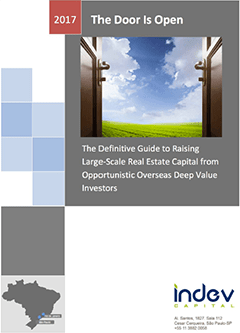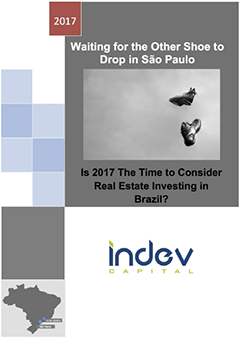
From left to right: Eduardo Cunha, Michel Temer, and Dilma Rousseff.
Most holiday office parties and Secret Santa gifts happened last week. However, one friend of yours sent a very important and profitable gift that you may have missed. If event-driven and deep-value emerging market real estate investment is in your 2017 plans, Michel Temer’s gift, Constitutional Amendment PEC 55, is important to understand and consider taking action. In fact, this surprise secret Santa gift could be your most profitable gift of 2017. Thank you, Michel!!!!!!
The picture above includes the main players in Brazil’s Unique Event-Driven Deep-Value Investment Opportunity: former Speaker of the Lower House Eduardo Cunha, current President Michel Temer (person who provided Christmas gift, our Santa), and former President Dilma Rousseff.
Brazil’s Budget Process Prior to PEC 55, December 15th, 2016
There’s a joke about a Brazilian economics student and his Professor that I read in Valor Economico, the equivalent of Brazil’s Wall Street Journal about a year ago. The joke goes something like this:
Student: Professor, I want to ask you a question.
Professor: Sure Student, how can I help?
Student: Well Professor, I have always been perplexed as to why Brazil has one of the highest real interest rates in the world.
The professor pauses, puts his hands on his forehead, thinks deeply and says to the student…
Professor: Student, this is because Brazil perhaps has the worst government budgeting process in the world.
The Free Lunch
This joke in an offhanded manner is not too removed from Brazil’s budgeting process reality in recent years. Why? During the post Real Plan era (from 1995 to today), Brazil had a challenge with many interest groups desiring a “free lunch.” In fact, Brazil has a word for this called “Bolsa” which literally means Bag (see picture above). For example, there is Bolsa Familia for people of low income, subsidized income to keep children in school, a Bolsa for the middle class, free public university education, there is a Bolsa for wealthy industrialists called BNDES, Brazil’s state-run bank that at one point offered below-inflation loans to large companies, a Bolsa for government workers, who receive very early retirement, etc.
Brazil attempted to have a Norway or Sweden-level social safety net with an emerging market GDP per capita. While there are definitely pockets of wealth and high GDP per capita in Brazil (particularly in the nicer neighborhoods of Sao Paulo and Rio de Janeiro), the math of a 200M-person emerging market nation attempting to achieve the Norway or Sweden social safety net was never going to end well. The result was significant budget deficits with spending overreaching revenue and becoming a larger and larger percentage of GDP.
Basic Economics – Flashback to College
 Well, as we remember from our college Introduction to Economics class (can I safely assume that you were awake?), government can only spend more than it receives in one of three ways.
Well, as we remember from our college Introduction to Economics class (can I safely assume that you were awake?), government can only spend more than it receives in one of three ways.
The first method is to increase taxes to boost government revenue. This is never popular but it is an option. The second method is to increase government debt through the issuance of treasuries. This happens often. The third method is to print money, which causes inflation. And of course, a fourth method is a combination of all three of these steps.
As we know from recent years in Brazil, significant overspending resulted in a combination of negative impacts such as high inflation (peaked at 10.71% in January 2016), high tax regime (35% of the GDP), and of course due to undisciplined fiscal policy the penalty of very high interest rates (peaked at 14.25%), and the GDP shrunk 10% percent in 3 years. A free lunch for everyone resulted in the worst ever economic decline in Brazil, presidential impeachment, and more importantly the urgency to make immediate changes. Brazil’s politicians simply have no choice but to get their house in order. Everybody wanting to keep their Bolsa, and increase it every year, ended up being a big problem. Alas, there is no free lunch! Ouch!
So what? InDev, why are you sending this email days before Christmas? So annoying, You know… I never liked that Joseph Williams character anyway….
Michel Temer’s gift to the investor community is greater clarity regarding a unique investment opportunity in 2017. As InDev has discussed in earlier newsletters (Sale Leaseback NL, Built to Suit NL), three events have created today’s unique real estate investment environment in Brazil.
I. The lack of liquidity.
The high cost of corporate credit is forcing companies to seek all options to reduce their cost of capital outside of bank financing. A big part of this credit crunch is the industrial Bolsa machine stopping its free lunch program (BNDES, the government development bank, provides less low cost money which radically changed the cost of credit for large companies). Ouch!
II. The weight of time.
In 2017 there is urgency to take action as the economy has been in a downturn for over two years. Although the macroeconomic forces appear to be improving, it is clear that there is a time delay to change the availability and the cost of credit situation. Many firms must take action in 2017.
III. New Generation of Owners and Executives
A new generation of managers are running many family-owned companies. Many companies are run by the second generation of a family. This generation has greater exposure to the true cost of capital and perhaps was more attentive (stayed awake) in Introductory Economics classes.
These three factors create a very attractive investment opportunity and quite honestly significant arbitrage opportunities, particularly in Sale LeaseBack Investments (please see our last SLB newsletter). Let’s discuss further Michel Temer’s exact Christmas Gift, PEC 55 a Brazilian constitutional amendment.
PEC 55
 Due to the time of year (travel, parties, time with friends and family, glasses of high quality wine), let’s make this quick!
Due to the time of year (travel, parties, time with friends and family, glasses of high quality wine), let’s make this quick!
On December 15th, 2016, Brazil’s government approved a constitutional amendment for the next 20 years that forces the government to only spend up to last year’s budget index by inflation. Spending more than this is actually against the law. This is a radical and revolutionary change in Brazil’s government’s behavior. It literally forces hard budget choices that were not part of the discussion in Brazil for the past several years.
Brazil’s lawmakers are now forced to make hard choices on spending priorities. In a normal, non-crisis environment this new law and these hard choices would be impossible to execute. The attitude in Brazil would have been a real fight over each special interest group’s free lunch, “Don’t take my Bolsa, take his Bolsa!!!!!” This impasse resulted in nothing happening and everyone’s free lunch getting larger and larger. This will now end!
This was only possible because Brazil was at the precipice of a very bad situation. In 2015, Brazil lost institutional grade credit rating. Although it is arguable that now one can see the light at the end of the tunnel of a very bad recession, Brazil does not have the power of the fiat currency enjoyed by the USA. The country simply cannot avoid making hard choices right now.
In fact, as an emerging market, Brazil not correcting its current fiscal course would result in a very, very ugly situation. Brazil has the unique advantage of a clear view of its neighbors of Argentina and Venezuela and recognizes clearly the price of not getting its house in order! This is why a constitutional amendment to limit spending, PEC 55, passed by an overwhelming majority.
This newsletter is not to state that this new law in Brazil will start Brazil on a path to become the next South Korea, a country that went from middle income to rich nation status in recent history in a relatively rapid period.
However, it is clear that Brazil is not a Venezuela and is clearly on a path to fix a key part of its budget, right the ship, and at least in the medium term provides a very interesting investment opportunity for event-driven deep-value type of investors. Let’s go specifically into what type of investment and/or arbitrage we are discussing. I hear this as I write, “Joseph, I am busy…What is the trade!!!!!?????? Where is the money in this idea?!?!?!?!”
The Trade – Investment Thesis and Opportunity
 Brazil’s interest rates were 14.25% until October 19th, 2016 while inflation at that time was 8%. This created a real interest rate of 6.25% percent. This was the peak of the crisis with no political resolution.
Brazil’s interest rates were 14.25% until October 19th, 2016 while inflation at that time was 8%. This created a real interest rate of 6.25% percent. This was the peak of the crisis with no political resolution.
Currently, Brazil’s interest rates are 13.75%, inflation is at 7% and real interest rates are 7%. A historical and “fair real interest rate for Brazil” is approximately 4% or 5% (not including inflation). In this very high current real interest rates scenario, we see a window for a unique investment opportunity.
Investors with liquidity can buy Sale Leaseback Assets or develop Build to Suit to a 200bps spread based on TODAY’S relative comparable transactions.
It is clear that with the PEC 55, fiscal changes will occur and there is ADDITIONAL potential cap rate compression in the governmental interest rate.
Brazil high quality assets trade at a premium (lower cap rate) to Brazil’s nominal interest rates in a normal environment.
PEC 55 provides the fiscal adjustment such that the government can reduce interest rates. For example, again, currently the one-year swap of the leak is at 12% with inflation currently at around 5% which creates a real interest rate of 7%.
A good friend of InDev and chief investment officer at TAG Investimentos, Andre Leite, who was very helpful to InDev in understanding the impact of PEC 55, stated that the neutral Brazil interest rate is approximately 4%. As Brazil’s fiscal policy corrects itself based on PEC 55, it is not difficult to see a real interest rate of 5%, perhaps 4%. Some local top economists consider a 4% real rate as a rate where Brazil has neither expansion nor compression in its activity. It can go even lower after the Social Security reform. Maybe as low as 3% (this may be a stretch but Brazil has significant swings, again it is an emerging market).
The math gets quite attractive. Again, an investor is able to purchase/develop to a 200 basis points spread above current comparable transactions. However, in a moderately improved fiscal environment, real estate has a premium (even lower cap rate) to the Brazil Selic rate, due to Brazil investors’ desire for inflation-adjusted income and capital appreciation.
It is not beyond one’s imagination to see basis point compression on quality cash flow long-term lease assets purchased in 2017 at 11% to 13% yield to costs achieve a 300 to 500 basis point compression using moderately conservative assumptions in a medium time frame. PEC 55 is quite a big deal.
Special thanks to TAG Investimentos and Andre Leite for their help in understanding PEC 55. If readers desire more detailed information about this investment opportunity, please let us know. It would be a shame to receive such a good gift and not put it to use.
Joseph W. Williams,
CEO & Founder InDev Capital.





